The Fathers for English Readers (14 vols.)
Digital Logos Edition
Overview
Perhaps no institution has influenced human history more than the Christian church. Its swaying and staying power over 2,000 years is due in no small part to the philosophical accomplishments of a core of early Church Fathers. Studying the Early Church Fathers then, is vitally important not just for Christians, but for anyone who wants to understand the scope and pattern of human history.
This collection surveys both the Latin and Greek Fathers, offering summary and analysis of the most important contributions of 14 Church Fathers. Designed to be accessible for “ordinary English readers,” these works by nineteenth- and early-twentieth-century historians relate key portions of the life and works of writers like Augustine, Jerome, Ambrose, St. John of Damascus, Clement of Alexandria, and St. Ignatius of Antioch. These 14 volumes unpack poems, hymns, sermons, doctrine, and more.
With Logos Bible Software, these valuable volumes are enhanced by cutting-edge research tools. Cross reference to more writings by Early Church Fathers and commentary from other scholars. Easily navigate to Scripture passages with citations that appear on mouseover in your preferred English translation. Important terms link to dictionaries, encyclopedias, and a wealth of other resources in your digital library. Powerful topical searches help you find exactly what you’re looking for. Tablet and mobile apps let you take the discussion with you. With Logos Bible Software, the most efficient and comprehensive research tools are in one place, so you get the most out of your study.
The The Latin Fathers for English Readers (9 vols.) and The Greek Fathers for English Readers (5 vols.) are also available for download individually.

- Examines the life and writings of the early Church Fathers
- Illuminates the historical context of Christianity’s development
- Probes early doctrines and theology
- Provides a functional knowledge of patristics to “ordinary English readers”
- Title: The Fathers for English Readers
- Publisher: SPCK
- Volumes: 14
- Pages: 3,312
- Resource Type: Biographies
- Topic: Church History
Individual Titles
- The Defenders of the Faith by Frederick Watson
- The Apostolic Fathers by Henry Scott Holland
- St. John of Damascus by Joseph Hirst Lupton
- Synesius of Cyrene: Philosopher and Bishop by Alice Gardner
- Clement of Alexandria by F.R. Montgomery Hitchcock
- Leo the Great by Charles Gore
- Gregory the Great by J. Barmby
- St. Ambrose: His Life, Times, and Teaching by Robinson Thornton
- Saint Augustine by Edward L. Cutts
- St. Patrick: His Life and Teaching by E.J. Newell
- Saint Jerome by Edward L. Cutts
- St. Hilary of Poitiers and St. Martin of Tours by John Gibson Cazenove
- St. Bernard: Abbot of Clairvaux by Samuel J. Eales
- The Venerable Bede G.F. Browne
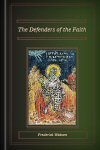
Frederick Watson brings together the writings of the Christian apologists of the second and third centuries, illuminating the “faith, hope, and patient endurance of the early Christians,” who influenced the moral and religious development of the church at a time when “the church and the world were open enemies. . . . [a] bitter struggle which ended in the victory of the church.”
Frederick Watson (1844–1906) was a fellow and theological lecturer at St. John’s College, Cambridge, as well as Tyrwhitt and Crosse scholar and Hulsean lecturer. He served as rector of Starston parish in Norfolk and vicar of St. Edward’s, Cambridge. He was honorable canon of Ely Cathedral and examining chaplain to the bishop of Ely. He also wrote Inspiration.
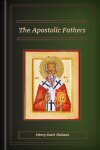
Henry Scott Holland examines the apostolic age, highlighting such early Church Fathers as St. Clement of Rome, St. Ignatius, and St. Polycarp, and expounding upon the epistle of Barnabas and the Shepherd of Hermas.
Henry Scott Holland (1847–1918) was regius professor of divinity at the University of Oxford and a canon of Christ Church, Oxford, and St. Paul’s cathedral. In 1889, he formed the Christian Social Union. His works include Pleas and Claims for Christ, God’s City and the Coming of the Kingdom, The Apostolic Fathers, and Creed and Character: Sermons.
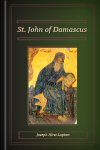
Joseph Hirst Lupton celebrates St. John of Damascus as a poet, hymnist, and theologian of the early church. Lupton examines the writings and life events of St. John—particularly his connection with the rise of Islam. He expounds upon the Greek Church in the eighth century and the Iconoclastic controversy, and presents this influential Church Father’s sermons, hymns, scriptural commentaries, and writings on natural science.
Joseph Hirst Lupton (1836–1905) graduated from St. John’s College, Cambridge, in 1858. He became second classical master at the City of London School, and was ordained in 1860. He became curate of St. Paul’s, Hampstead. He was a fellow of St. John’s College from 1860 to 1863. In 1864, he was appointed surmaster of St. Paul’s School, a position he held for 35 years. He was appointed Hulsean lecturer in 1887, and a preacher to the Honourable Society of Gray’s Inn in 1890. He earned his DD in 1896 and won the Seatonian prize at Cambridge for a sacred poem. He wrote several works, including A Life of John Colet.
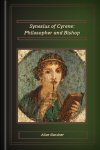
British historian Alice Gardner presents the life of Synesius of Cyrene, as illustrated by his letters and other writings. Beginning with Synesius’ birth and education, Gardner paints a portrait of this early Church Father as a patriot, a country gentleman, a philosopher, a working bishop, and a champion of the church. She outlines his final days, and also includes two hymns by Synesius and a chronological summary of events.
Alice Gardner (1854–1927) was an English historian and teacher whose linguistic acumen made her a significant figure in academia. She graduated at the top of her class from Newnham College, Cambridge, in 1879. She taught at Plymouth High School and Bedford College, London. From 1884 to 1914, she taught and directed studies in history at Newnham College. During World War I, she worked in the Foreign Office, and in 1915 she took charge of the history department at Bristol University. Bristol University awarded her an honorary MA and appointed her as reader in Byzantine studies. She was a fellow of the Royal Historical Society and member of its council, as well as vice president of the Historical Association.
Gardner wrote two history books for children and many other works, including Julian: Emperor and Philosopher, Theodore of Studium: His Life and Times, and The Lascarids of Nicaea. She was the first to make the Eastern Mediterranean writings of the Byzantine era accessible to an English-speaking audience, and her translations are still in use today.
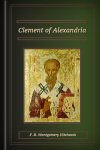
This comprehensive biography of Clement of Alexandria by F.R. Montgomery Hitchcock examines Clement’s writings, philosophy, theology, doctrines, life, and character. Hitchcock offers a detailed look at Clement’s years in the city of Alexandria—including his family home, university life, and religious formation—as well as in the Catechetical School of Alexandria, and presents several texts that highlight Clement’s influence on the church and the development of Christianity.
F.R. Montgomery Hitchcock (1865–1951) was Donnellan Lecturer in the University of Dublin and examining chaplain to the bishop of Killaloe. He was also the author of Irenaeus of Lugdunum: A Study of His Teaching and St. Patrick and His Gallic Friends.
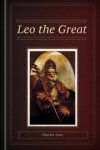
This volume from influential Anglican theologian Charles Gore covers the life and work of Pope Leo the Great, the man who famously negotiated with Atila the Hun for Rome’s safety. A Doctor of the Church, Leo wrote the influential Tome that fleshed out Catholic Christology, and developed the doctrines of papal authority. Gore’s volume on Leo bolsters your library’s clout in patristics and church history, providing a thorough overview of the life and work of the third-longest reigning pope.
Charles Gore (1853–1932) was educated at Harrow School and the University of Oxford. Gore later became fellow at Trinity College, Oxford, and vice principal at Cuddesdon Theological College. He later became the bishop of Worcester, the bishop of Birmingham, and the bishop of Oxford. Charles Gore published over 15 volumes of works including The Church and the Ministry, St. Paul's Epistle to the Romans: A Practical Exposition (2 vols.), and The Body of Christ.
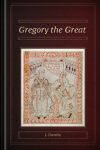
Gregory the Great, best known as the namesake of the Gregorian chant, was one of the most prolific writers to serve as pope, and the first pope to have come from a monastic background. Called the “last good Pope” by Calvin, Gregory greatly influenced Christian liturgy, and is one of the four original Doctors of the Church. James Barmby’s volume provides valuable insight into the history of Christian liturgy, monasticism, and the life and works of this great Church Father.
James Barmby was a nineteenth-century academic. He was master of Hartfield College, fellow of Magdalen College, and vicar of Pittington.
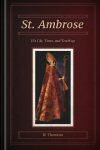
Saint Ambrose was archbishop of Milan and one of the most influential figures of the early church. Ambrose combated many heresies in the early church, most notably Arianism, and influenced Augustine of Hippo. Robinson Thornton’s volume on Ambrose provides historical insight into the church’s liturgy, theology, and early battles against heresy.
Robinson Thornton was vicar of St. John’s at Notting Hill and fellow of St. John’s College, Oxford.
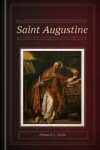
Perhaps no Christian writer outside the biblical canon has had a greater influence on Western thought than Augustine of Hippo. His Confessions and City of God left large marks in the philosophical landscape and are still widely read today in a range of disciplines. Edward L. Cutts’ volume on Augustine is an excellent introduction to this Church Father who continues to be relevant to anyone asking life’s greatest questions.
Edward L. Cutts (1824–1901) was a church historian who wrote influential biographies of several early church figures, including Jerome and Constantine. He received an honorary DD from the University of the South, Sewanee.
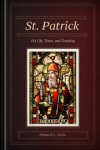
Saint Patrick, best known as Ireland’s patron saint, was a fifth-century missionary. E.J. Newell’s volume studies St. Patrick’s life, work, and writings. Newell’s work thoughtfully examines the man whose missionary work changed the religious complexion of Western Europe.
E.J. Newell is also the author of A Popular History of the Ancient British Church.
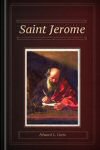
One of the four “Great” Latin fathers and an original Doctor of the Church, Saint Jerome translated the Latin Vulgate Bible, and the volume of his writings is second only to Augustine among early Church Fathers. Edward L. Cutts’ volume on Jerome is full of valuable insight into the history of Christian dogma and Bible translation and commentary.
Edward L. Cutts (1824–1901) was a church historian who wrote influential biographies of several early church figures, including Jerome and Constantine. He received an honorary DD from the University of the South, Sewanee.
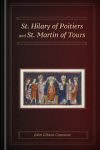
This work covers the life and works of two of the early church’s most influential fourth-century Latin fathers: Hilary of Poitiers and Martin of Tours. John Gibson Cazenove’s work provides valuable insight into the development and spread of Christianity across Western Europe.
John Gibson Cazenove was chancellor of St. Mary’s Cathedral.
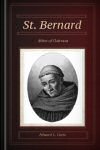
Bernard of Clairvaux was an influential twelfth-century churchman, responsible for the spread of the Cistercian order. Barnard’s writings also influenced Reformed thought, developing the doctrine of Sola Fide. Samuel J. Eales work provides valuable insight into the Catholic Church in the Middle Ages and the background of controversies that would shape centuries of church history.
Samuel J. Eales was principal of St. Boniface College, Warminster.
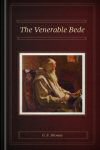
Saint Bede’s monumental work, The Ecclesiastical History of the English People, earned him the title, “father of English history.” Bede also translated the Latin and Greek work of other Church Fathers, making their work accessible to a much wider audience. G.F. Browne’s work on Bede provides valuable insights into church historiography and the theological development of Western Europe in the Early Middle Ages.
G.F. Browne (1833–1930) was bishop of Stepney from 1895 to 1897 and bishop of Bristol from 1897 to 1914. He was also a professor of Archaeology.
This title is included in the following collections
You can save when you purchase this product as part of a collection.
2025 Orthodox Gold
$849.99$679.992025 Orthodox Platinum
$1,499.99$1,199.99Logos 8 Anglican Platinum Lega...
$1,499.99$1,499.99Logos 7 Anglican Platinum Lega...
$1,499.99$1,499.99
- $1,499.99
- $2,999.99$2,249.99
- $2,999.99
- $2,999.99
- $2,999.99
- $2,999.99
- $4,749.99$3,324.99
- $4,749.99$3,562.49
- $4,749.99
- $4,749.99
- $4,749.99
- $4,749.99
- $4,749.99
- $12,102.39$7,299.99
- $11,377.57$8,499.99
- $12,989.68$10,391.74
- $11,399.99
- $11,399.99
- $23,999.99$17,999.99
- $21,749.99
- $24,999.99
Reviews
3 ratings
Kelly Fleming
12/23/2023

Lu Hastings
11/11/2023

Kevin Bratcher
6/12/2018